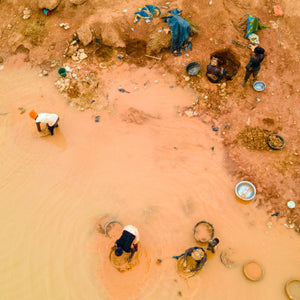The Impact of Climate Change in Sub-Saharan Africa
Climate change is a global crisis of modern times, and its impact is felt more strongly in some parts of the world than others. The impact of climate change in sub-Saharan Africa, for example, is astounding. Across the region, people’s lives are greatly affected by rising temperatures and unpredictable weather patterns caused by climate change. From destabilizing food security to exacerbating poverty levels, it’s clear that action needs to be taken if we are to protect those already suffering from the consequences of climate change. We take a closer look at how climate change is affecting countries within sub-Saharan Africa, and the potential solutions that can mitigate its impact.
Why is sub-Saharan Africa particularly vulnerable to climate change?

Climate change refers to the long-term changes in the Earth's climate that are caused by human activities, such as burning fossil fuels and deforestation. Unfortunately, sub-Saharan Africa is particularly vulnerable to its disastrous effects, despite the fact that the continent only accounts for between 2-3% of global greenhouse gas emissions.
The impact of climate change in sub-Saharan Africa is particularly great due to the region’s lack of effective infrastructure, low levels of economic development, vulnerable ecosystems, and reliance on climate-sensitive sectors such as agriculture. Sub-Saharan Africa faces challenges such as intensified temperature extremes, prolonged droughts, declining crop yields and the spread of infectious diseases. Natural disasters also seriously affect 13 million people, and they’re responsible for at least 1,000 deaths every year.
The impact of climate change on agriculture in sub-Saharan Africa

Despite efforts to diversify economies and increase industrialization, much of Africa continues to be heavily reliant on agriculture, which remains a critical source of income and livelihoods for millions of people on the continent. One fifth of sub-Saharan Africa’s economic input, for example, depends on agriculture. Climate change threatens to destroy this way of life, and its impact is already being felt.
Climate change has brought prolonged droughts, irregular rainfall patterns, and other extreme weather conditions that devastate entire harvests. These conditions also cause soil degradation and nutrient depletion, making it increasingly difficult for subsistence farmers to replenish their land and provide enough crops to support their families.
How climate change is impacting water availability

In sub-Saharan Africa, climate change is having a profound impact on the availability of water. Droughts and erratic weather patterns are taking a heavy toll on water resources, making it increasingly difficult for communities to access clean water.
In some cases, entire regions have been left without access to water, leading to devastating consequences for agriculture, food security and general human health. High water stress now affects about 250 million people across Africa.
As temperatures rise and rainfall patterns become more unpredictable, it’s clear that urgent action is needed to mitigate the impact of climate change in sub-Saharan Africa.
The human costs of climate change on health and wellbeing
Climate change has undoubtedly caused significant adverse impacts on health and wellbeing, especially in sub-Saharan Africa. The region is already grappling with many health issues such as malnutrition, infectious diseases and poor access to health services.
Climate change has worsened the situation by altering ecological systems and creating conditions that allow disease spreaders like mosquitoes and ticks to thrive, as well as promoting the survival and transmission of disease-causing organisms like bacteria and viruses.
For example, changing temperatures and rainfall patterns can create breeding grounds for mosquitoes that spread diseases like malaria, while rising temperatures can increase the prevalence of waterborne diseases like cholera.
On top of this, extreme heat waves, droughts, and floods have caused crop failures, leading to food shortages, malnutrition, and hunger. This, in turn, has resulted in increased cases of childhood stunting and other avoidable health complications.
Solutions to mitigate the impact of climate change in sub-Saharan Africa
Climate change presents unique challenges to many regions around the world, and sub-Saharan Africa is no exception. The increased temperatures, changing rainfall patterns, and extreme weather events that come with it have a significant impact on agriculture, water availability, health and life across the region.
The effects of the climate crisis will further deepen poverty throughout the region, unless we take meaningful action to mitigate its effects on a large scale.
Despite the obvious challenges, sub-Saharan Africa has the potential to lead the way in innovative solutions for adaptation and mitigation. These solutions could include investing in renewable energy, improving agricultural practices, and developing better infrastructure to withstand extreme weather events.
With the support of the international community and charitable initiatives, the region could not only help protect its vulnerable populations, but also make the transition to a more sustainable, low-carbon future.


